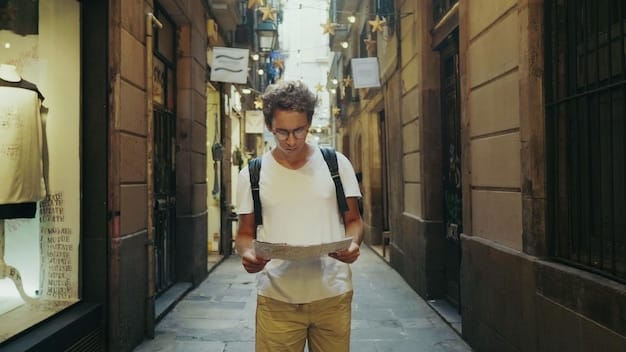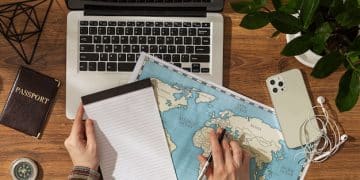Stay Safe While Traveling: Top 7 Tips for 2025

Ensuring your safety while traveling in 2025 involves proactive planning and awareness; these seven essential safety tips cover everything from securing your belongings and staying connected to being mindful of your surroundings and health.
Planning a trip for 2025? While travel can be exhilarating, it’s crucial to prioritize your safety. This article provides stay safe while traveling: 7 essential safety tips for 2025, equipping you with the knowledge to navigate your adventures with confidence and minimize potential risks.
Plan Ahead and Research Your Destination
Before embarking on any trip, thorough planning is essential for your safety. Begin by researching your destination to understand potential risks and cultural nuances.
Knowing local laws, customs, and any specific safety concerns can help you avoid unintended issues and stay better protected.
Understand Local Laws and Customs
Familiarize yourself with the legal and cultural expectations of your destination. Research local customs to ensure respectful behavior and avoid unintentionally breaking any laws. This knowledge is key to preventing misunderstandings and staying safe.
Identify Potential Threats and Risks
Investigate potential safety concerns, such as areas with high crime rates, political instability, or natural disaster risks. Stay informed about any travel advisories or warnings issued by your government to make informed decisions about your travel plans.
- Check travel advisories from your country’s embassy or consulate.
- Read online reviews and forums to understand potential risks.
- Research local emergency services and contact information.
By planning ahead and being well-informed, you can mitigate risks and enjoy your travels more securely.
Secure Your Belongings and Documents
Protecting your valuables and important documents is crucial to ensuring a smooth and worry-free travel experience. Implement strategies to keep your belongings secure and avoid theft or loss.
Taking proactive measures can significantly reduce your chances of becoming a target for theft and maintain your peace of mind throughout your journey.

Use a Travel Wallet or Money Belt
Opt for a travel wallet or money belt that can be worn discreetly under your clothing. Keep essential items like your passport, credit cards, and cash in this secure location to minimize the risk of theft.
Carry Digital Copies of Important Documents
Store digital copies of your passport, driver’s license, and other crucial documents on your phone or in a secure cloud storage. In case of loss or theft, these copies can expedite the replacement process and assist with identification.
- Scan or photograph your passport, visa, and driver’s license.
- Email copies to yourself or upload them to a secure cloud service.
- Keep a list of important contact numbers, such as embassy and credit card companies.
Securing your belongings and documents is a fundamental step in protecting yourself against potential theft or loss while traveling, allowing you to focus on enjoying your trip.
Stay Connected and Communicate
Maintaining communication with family and friends while traveling is essential for your safety and peace of mind. Staying connected allows you to share updates, seek assistance if needed, and ensure someone knows your whereabouts.
Leveraging technology and planning your communication strategy can enhance your safety and provide reassurance to your loved ones.
Purchase a Local SIM Card or International Roaming Plan
Acquire a local SIM card or an international roaming plan to access reliable mobile data and make calls. This ensures you can stay connected for navigation, communication, and accessing important information.
Share Your Itinerary with Someone You Trust
Before you leave, share your travel itinerary with a trusted friend or family member. Include details such as flight numbers, hotel addresses, and planned activities. Regular updates during your trip will keep them informed of your location and well-being.
- Create a detailed itinerary with dates, locations, and activities.
- Share it with a trusted contact.
- Set up a check-in schedule with your contact.
Staying connected and communicating effectively is a simple yet powerful way to enhance your safety and create a support system while traveling.
Be Aware of Your Surroundings
Remaining vigilant and observant of your environment can significantly reduce your vulnerability to potential threats. Being aware of your surroundings involves paying attention to people, places, and situations that may pose a risk.
This heightened awareness can help you avoid dangerous situations and stay safe while exploring new environments.
Avoid Distractions While in Public
Minimize distractions such as excessive phone use or wearing headphones that block out ambient sounds. Focus on your surroundings to notice any suspicious behavior or potential hazards. Stay alert and avoid becoming an easy target.
Trust Your Instincts
If a situation or person makes you feel uncomfortable, trust your intuition. Remove yourself from the situation promptly and seek a safer environment. Your instincts are often reliable indicators of potential danger.

- Pay attention to who is around you and their behavior.
- Be cautious in crowded or poorly lit areas.
- If you feel uneasy, leave immediately.
By being aware of your surroundings and trusting your instincts, you can proactively avoid risky situations and ensure your safety while traveling.
Protect Your Health
Prioritizing your health while traveling is essential for a safe and enjoyable experience. Ensuring you are prepared for potential health risks can prevent illness and ensure you can handle any medical situations that may arise.
Focusing on preventative measures and knowing how to access medical care can greatly enhance your travel safety.
Consult Your Doctor Before Traveling
Schedule a visit with your doctor to discuss any necessary vaccinations, medications, or health precautions specific to your destination. Obtain any required prescriptions and ensure you have an adequate supply of any medications you regularly take.
Purchase Travel Health Insurance
Invest in travel health insurance that covers medical expenses, emergency evacuations, and repatriation. Ensure the policy adequately covers your destination and planned activities.
- Research required vaccinations and obtain them in advance.
- Carry a first-aid kit with essential supplies.
- Know the location of local hospitals and clinics.
Protecting your health through careful planning and preparation can prevent health-related incidents and ensure you have access to medical care if needed, contributing to a safer travel experience.
Avoid Risky Behaviors
Refraining from engaging in risky behaviors is crucial for safeguarding your well-being while traveling. This includes making informed decisions about activities, transportation, and substances.
Exercising caution and avoiding unnecessary risks can greatly minimize your chances of encountering problems and ensure a safer trip.
Be Cautious with Alcohol and Drugs
Consume alcohol responsibly and avoid using illegal drugs. Intoxication can impair your judgment, making you more vulnerable to accidents, theft, and other dangers. Stay in control of your actions and surroundings.
Use Reputable Transportation Services
Opt for reputable taxi services, ride-sharing apps, or public transportation options. Avoid accepting rides from unofficial or unlicensed drivers. Research safe transportation methods in your destination and stick to reliable options.
- Only use licensed taxis or ride-sharing services.
- Avoid walking alone at night in unfamiliar areas.
- Be cautious when participating in adventurous activities.
By avoiding risky behaviors, you can protect yourself from potential harm and ensure a safer, more enjoyable travel experience.
Emergency Preparedness
Being prepared for emergencies can make a significant difference in handling unforeseen situations while traveling. Having a plan and knowing how to respond can mitigate the impact of emergencies and ensure your safety.
Taking proactive steps to prepare for potential emergencies can provide peace of mind and increase your ability to manage crises effectively.
Know Emergency Contact Numbers
Compile a list of emergency contact numbers, including local police, ambulance, fire department, and your embassy or consulate. Keep these numbers readily accessible in your phone and on a piece of paper.
Learn Basic First Aid
Take a basic first aid course to learn essential skills for handling minor injuries and medical emergencies. Knowing how to administer first aid can provide crucial assistance until professional help arrives.
- Keep a list of emergency contacts in your phone and on paper.
- Familiarize yourself with basic first aid techniques.
- Know the location of the nearest hospital or medical facility.
Preparing for emergencies can provide you with the knowledge and resources needed to respond effectively to unexpected situations, enhancing your overall safety while traveling.
| Key Point | Brief Description |
|---|---|
| 🗺️ Plan Ahead | Research destination laws and customs to avoid potential risks. |
| 🔑 Secure Belongings | Use travel wallets and keep digital copies of important documents. |
| 📱 Stay Connected | Get a local SIM or roaming plan; share your itinerary with trusted contacts. |
| 🚑 Health First | Consult your doctor, get travel insurance, and carry a first-aid kit. |
Frequently Asked Questions
▼
Researching local laws, customs, and potential risks such as high crime rates or natural disasters is essential. Check travel advisories from your government’s embassy, read online reviews, and identify local emergency services to prepare effectively.
▼
Use a travel wallet or money belt worn under your clothing to secure valuables like your passport, credit cards, and cash. Keep digital copies of important documents on your phone or in secure cloud storage for easy access if needed.
▼
Staying connected allows you to share updates with family and friends, seek assistance if needed, and ensures someone knows your whereabouts. Purchase a local SIM card or international roaming plan and share your itinerary with a trusted contact.
▼
Consult your doctor for necessary vaccinations and medications before traveling. Purchase travel health insurance that covers medical expenses and emergency evacuations. Carry a first-aid kit with essential supplies and know the location of local hospitals.
▼
Compile a list of emergency contact numbers, including local police, ambulance, and your embassy. Learn basic first aid skills to handle minor injuries and medical emergencies. Keep emergency numbers accessible and know the location of the nearest medical facility.
Conclusion
By following these seven essential safety tips, you can greatly enhance your travel experiences in 2025. Planning ahead, securing your belongings, staying connected, being aware, protecting your health, avoiding risky behaviors, and preparing for emergencies are key to a safe and enjoyable journey.





